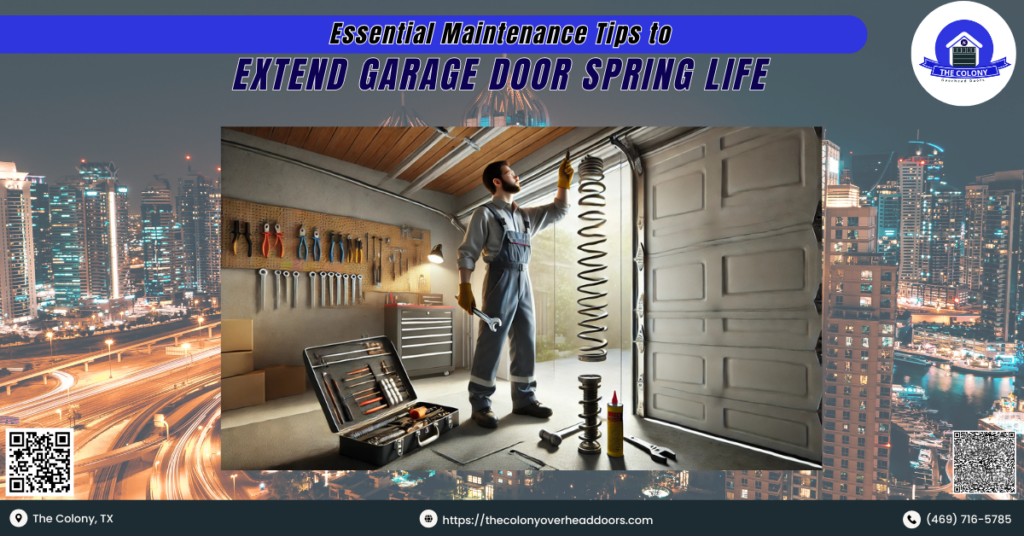Discover expert tips to extend the lifespan of your garage door springs. Trust The Colony Overhead Doors for top-notch garage door repair in The Colony, TX.

Keep Your Garage Door Springs in Optimal Shape
Garage door springs might not be the first thing on your mind, but they play a crucial role in keeping your garage door functioning smoothly. They bear the weight of the door and ensure it opens and closes efficiently. A broken spring can lead to inconvenient breakdowns, safety risks, and costly repairs. The good news? With a few simple maintenance tips, you can extend their lifespan and avoid emergency garage door repairs. Let’s dive into some essential maintenance tips to ensure your springs stay in peak condition and your garage door operates flawlessly.
Common Types of Garage Door Springs
Understanding the type of springs your garage door uses is essential for proper maintenance. The two most common types are:
- Torsion Springs: Mounted above the garage door, these springs use torque to lift and lower the door.
- Extension Springs: Located on the sides of the garage door, these stretch and contract to provide movement.
Each type requires specific maintenance techniques, so it’s important to identify which kind you have.
Why Do Garage Door Springs Wear Out?
Before we discuss maintenance, it’s important to understand why garage door springs break down over time. Several factors contribute to wear and tear, such as:
1. Frequent Use
Every time you open and close your garage door, the springs stretch and contract. Over time, this repeated action leads to metal fatigue, gradually weakening the springs. On average, standard garage door springs are rated for about 10,000 cycles, but this can vary depending on the quality of the spring and how often you use your garage door.
2. Lack of Lubrication
Without proper lubrication, garage door springs experience increased friction. Friction accelerates wear and tear, causing the metal to deteriorate more quickly. Lubrication reduces friction and allows the springs to operate smoothly and efficiently.
3. Temperature Changes
Extreme weather conditions, common in The Colony, TX, can significantly impact garage door springs. The fluctuating temperatures cause the metal to expand and contract, making the springs brittle and prone to snapping. This is particularly important during the hot summers and chilly winters in Texas.
4. Rust and Corrosion
Garage door springs are made of metal, and when exposed to moisture, they can develop rust. Rust weakens the metal structure and increases the risk of breakage. Regular maintenance can help prevent rust from forming.
5. Poor Installation
Incorrect installation of springs can place undue stress on the components, leading to premature wear. Ensuring professional installation helps maintain spring longevity.
Simple Maintenance Tips to Extend Garage Door Spring Life
Taking care of your garage door springs doesn’t require much effort, but it does demand consistency. Follow these practical tips to extend the lifespan of your springs and avoid the need for frequent garage door spring repairs.
1. Regular Lubrication
One of the easiest ways to keep your garage door springs in top condition is to lubricate them regularly. Use a high-quality silicone or lithium-based lubricant to reduce friction and prevent rust. Applying lubricant creates a protective layer that minimizes wear and tear.
Pro Tip: Apply lubricant every 3-6 months for optimal performance. Be sure to wipe off any excess lubricant to avoid attracting dust and debris.
2. Perform Visual Inspections
Regular visual inspections help catch potential problems before they turn into major issues. Look for the following signs of wear and tear:
- Gaps in the coils indicate overstretched springs.
- Rust or corrosion, which can weaken the metal and lead to breakage.
- Loose or stretched springs, which can compromise the door’s balance and functionality.
If you notice any of these issues, it might be time to call for a professional garage door repair in The Colony, TX.
3. Test the Balance
A balanced garage door puts less strain on the springs, prolonging their lifespan. To check the balance:
- Disconnect the garage door opener by pulling the release handle.
- Lift the door manually to the halfway point.
- If it stays in place, the balance is fine. If it falls or rises, the springs may need adjustment by a professional.
4. Avoid DIY Repairs
Garage door springs are under high tension, making them dangerous to handle without the right tools and expertise. Attempting DIY repairs can result in serious injuries or further damage to your garage door system. Instead, seek professional assistance for garage door spring repair to ensure safe and proper handling.
5. Schedule Professional Inspections
Even if your garage door appears to be working fine, annual inspections by a garage door expert can catch potential issues early. A professional technician can fine-tune your system, ensuring that springs, cables, and rollers are in excellent condition and functioning optimally.
Frequently Asked Questions (FAQs)
Q: How long do garage door springs typically last?
A: On average, garage door springs last between 7 to 10 years, depending on usage and maintenance. Frequent use may shorten their lifespan.
Q: What are the signs that my garage door springs need replacement?
A: Difficulty opening the door, a loud bang, or visible gaps in the coils indicate the need for garage door replacement.
Q: Can I use any lubricant on my garage door springs?
A: No, it’s best to use a silicone-based lubricant specifically designed for garage doors to avoid attracting dust and debris.
Protect Your Investment
Your garage door is an essential part of your home or business, and maintaining its springs is a simple way to ensure smooth operation. By following these easy maintenance tips—like regular lubrication, visual inspections, and professional check-ups—you can extend the lifespan of your garage door springs and avoid costly replacements.
If you’re in need of garage door installation, garage door replacement, or any other garage door services, The Colony Overhead Doors is here to help. Our team proudly serves The Colony, TX, and surrounding areas, including popular spots like Stewart Creek Park and The Grandscape.
Ready to give your garage door the care it deserves? Contact The Colony Overhead Doors today for top-notch garage door repair in The Colony, TX.
